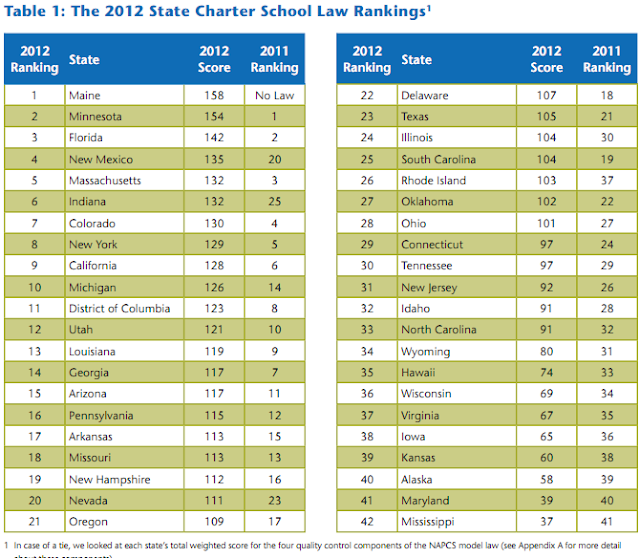| Measuring Up to the Model: A Ranking of State Charter School Laws, 2012 |
| 2011 has been a significant year for charter school policy across the country. At long last, Maine enacted a charter school law, becoming the 42nd jurisdiction that allows this innovative public school option. Ten states lifted their caps on charter school growth (either partially or entirely). Most notably, North Carolina eliminated its cap of 100 charter schools, Michigan phased out its cap on the number of charter schools that can be approved by public universities, and Indiana and Wisconsin removed their limits on virtual charter school enrollment. Seven states strengthened their authorizing environments. Most significantly, four states created new statewide charter boards (Illinois, Indiana, Maine, and Nevada), while New Mexico and Rhode Island passed major quality control measures setting the stage for the future growth of high-quality public charter schools in these states. Ten states improved their support for charter school funding and facilities. Of particular note, Indiana enacted legislation that creates a charter school facilities assistance program to make grants and loans to charter schools, appropriates $17 million to this program, and requires school districts to make vacant space available to public charter schools to lease for $1 a year or to buy for $1. Also, Texas enacted a law that allows state-authorized charter schools that have an investment grade rating and meet certain financial criteria to apply to have their bonds guaranteed by the Permanent School Fund. As of this writing, there were bills with major charter school improvements pending in New Jersey, Pennsylvania, and Wisconsin. In addition, we expect to see big pushes for strong legislation in several other states in 2012. What’s most encouraging about the charter school movement’s legislative efforts is that they’re more frequently marrying growth and quality. As we’ve long argued at NAPCS, the longterm viability of the charter school movement is primarily dependent on the quality of the charter schools that open. It’s critical that state lawmakers recognize the importance of charter school quality – and the impact that their laws have on it. We are glad to see that they are increasingly doing so. We hope this report, and the model law it is based upon, continue to be useful tools to charter school supporters as they push for laws that support the creation of more high-quality public charter schools, particularly for those students most in need of a better public school option |
As #okleg returns, 5 questions linger for ODMHSAS
-
[image: ODMHSAS questions, Oklahoma mental health]Drama at the Oklahoma
Department of Mental Health and Substance Abuse Services is as long-running
as th...
1 hour ago

